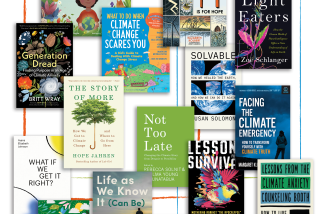Discoveries: ‘The Chairs Are Where the People Go’ by Misha Glouberman with Sheila Heti
The Chairs Are Where the People Go
How to Live, Work, and Play in the City
Misha Glouberman with Sheila Heti
Faber and Faber:: 175 pp., $13 paper
Sheila Heti wanted to write about her friend Misha Glouberman. The Canadian performance artists had collaborated on a few projects; not only did she find that he was a “force of reason in any situation,” she felt the “world should have a book about everything he knows.”
The result is this glorious collection of essays, all in Glouberman’s words, shaped by Heti. They are about living in the city, making friends in the city, compromising in the city, and having fun just about anywhere. There’s something deeply hip and also endearing about Glouberman’s observations. For example, it’s OK not to make eye contact in the city, he believes, because a city is “a place where you can be alone in public, and where you have that right.” Or, “[i}t’s a real shock to discover that making friends doesn’t take care of itself in adulthood.... It’s useful to remember that friendship needs an activity associated with it,” he says, or, if you are “an ambitious sort, you can try to create your own world around you, and maybe have a party at your house every two weeks.”
How to arrange chairs at a reading in ways that involve your audience, how to organize a neighborhood to petition toget a noisy bar to quiet down in the wee hours, how to play charades, how to appreciate the beauty of miscommunication; these are just a few of the pieces of truly practical information contained in these pages. “A Decision Is a Thing You Make,” and “Seeing Your Parents Once a Week” are gentle reminders. The general message is collaboration amid density, hilarity despite and with all due respect for (some of) the rules.
12 Who Don’t Agree
Valery Panyushkin, translated from the Russian by Marian Schwartz
Europa Editions: 259 pp., $15 paper.
Three months before the 2007 presidential elections in Vladimir Putin’s Russia, a march was organized by various thinkers and leaders to assure that the elections would be held freely, that all parties would “get equal access to television time,” and that all presidential candidates would be registered.
The authorities gave permission for the rally but reneged in various ways on their agreement. Protesters were dispersed, beaten and arrested. Valery Panyushkin, a journalist in Russia, wrote this book about 12 of his friends who were involved in that protest (including Garry Kasparov, former world chess champion and leader of the United Civic Front Party).
In describing their lives, their motivations, their relationships to the government and the various forms of harassment they have suffered, Panyushkin reveals a great deal about post-Soviet Russia and the kinds of constraints on freedom that most citizens still live with and try to work around.
We learn a bit about the various special forces, the OMON (special-purpose police), the FSB (Federal Security Service) and others who follow dissidents, often arrest them on false charges and who have been involved in horrifying, violent events. Panyushkin writes in vivid tableaux — for example, a scene in a cafe deep in the woods, the candles sputtering, the dissidents bent over their maps; a gray street in St. Petersburg, the banners and flags of the protesters waving against the line of OMON officers wielding truncheons.
My Green Manifesto
Down the Charles River in Pursuit of a New Environmentalism
David Gessner
Milkweed Editions: 226 pp., $15 paper
“Why does environmentalism, much of which is just common sense, so often sound like nagging?” “Maybe the musty way of talking about nature needs to be thrown over a clothesline and beaten with a broom,” writes David Gessner, a one-man Socratic band. “A month off from talk of the apocalypse?” he asks. “Maybe even a year-long moratorium on books that begin with the words The End of, The Death of, or The Last?”
You get the gist of Gessner’s intentions as he pushes off in a kayak at the mouth of the Charles River. He wants to submerge himself in nature (not wilderness, but the nature most of us have some access to) and come up with a new lexicon, a livelier, more emotionalway of talking, caring and being.
Between the blue herons, painted turtles and human characters, Gessner reviews the great names in American environmental thought, chewing some of them up and spitting them out, digesting or marinating others and rarely, oh, so rarely, admitting the longevity of others, like Wendell Berry and John Hay. His grappling with these thinkers is raw and honest and often irritating; his self-consciousness amusing and his frustration inspiring. Swallowing this hook, line and sinker makes good victims and followers; argument, Gessner reminds his readers, is one way to create paradigms. “I will work to keep my life wild,” he vows. “Not frat boy wild, mind you, even if there is the occasional beer, or four, consumed.” He’s not for everyone, but there’s a lilt in his jig that many will find invigorating.
Salter Reynolds is a Los Angeles writer.
More to Read
Sign up for our Book Club newsletter
Get the latest news, events and more from the Los Angeles Times Book Club, and help us get L.A. reading and talking.
You may occasionally receive promotional content from the Los Angeles Times.







